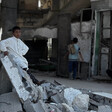The Electronic Intifada Podcast 24 September 2025
“The problem is there is no sovereignty, there is no independence,” he added.
“They’re afraid that if they start using this leverage, that somehow they will either be deposed or that they will be somehow pressured in a way that they cannot sustain it.”
The son of refugees expelled from Palestine in 1948, Al-Arian was for over a decade the target of politically motivated persecution by US authorities.At the height of the US “War on Terror” in 2003, he was indicted on dozens of counts for alleged support of Palestinian Islamic Jihad. Despite the US spending millions of dollars on investigations and a lengthy trial, a federal jury did not convict Al-Arian on a single count.
As the result of an agreement with Al-Arian to end his family’s ordeal, US authorities eventually dropped charges and deported him to Turkey in 2015.
This month, leaders of Arab and Muslim states met in Doha, capital of Qatar, to discuss Israel’s attack on the Gulf state on 9 September, in attempt to assassinate Hamas negotiators. Qatar is a close US ally and hosts a major American military base.
When asked whether the Israeli attack might alter those Arab states’ relationship with the US as an ally, al-Arian expressed little optimism.
“Unfortunately, the meeting of the Arab and Muslim countries in Doha was very hot in rhetoric but on substance – it was very, very poor,” said Al-Arian. He said none of the statements issued would cause Israel to “blink twice about not repeating this act.”
Associate editor Asa Winstanley asked how Arab countries could realistically pressure the US to curb Israel’s violence. Professor Al-Arian suggested that Arab states could start accepting currencies other than the US dollar for regional oil sales.
Within a “few months, not years, the dollar will crash. And that would be a huge, huge problem for the US,” said Al-Arian.
“They can also start withdrawing their investments,” al-Arian said.
“If they just draw 10 percent a month. I can guarantee you, within two months, this war would stop tomorrow, if not within a week or two.”
Al-Arian explained why particularly wealthy Arab countries may be hesitant to take such actions.
“Gulf countries alone have upward of $2 trillion invested in the US economy,” he said.
“They know if they start taking different policies, or policies that will displease the United States, that the US could actually go and confiscate that money in the same way they confiscated $300 billion of Russian money after the Ukraine war.”
On the other hand, Arab countries with a dependence on the US risk their economies being destroyed if they go against Washington.
Al-Arian discussed Israel’s continued attacks on multiple countries in the region.
In addition to the ongoing genocide in Gaza, Israel has attacked Lebanon, Syria, Yemen, Iran and more recently Tunisia and Qatar.
“I don’t think there is anything beyond that in human history,” said Al-Arian.
Israel’s destruction of Gaza City
Associate editor Nora Barrows-Friedman reported on Israel’s invasion of Gaza City.
Israeli airstrikes throughout the coastal enclave, but concentrated in Gaza City, have been constant and relentless. Israel has continued to obliterate high-rise towers, apartment buildings, tent shelters and people trying to flee on foot and in vehicles.
Israel has killed at least 416 Palestinians and injured at least 2,200 between 10 September and 17 September, according to official records from the Palestinian Ministry of Health in Gaza.
For the full news round up, Barrows-Friedman’s news report can be viewed here or read in article form.
Contributing editor Jon Elmer reported on Israel’s evacuation orders of the city.
According to a press release by the Gaza Media Office last week, approximately 190,000 people have left Gaza City which means over one million people remain as Israel invades.
Many have evacuated to al-Mawasi refugee camp in the south of Gaza.Israel claims that al-Mawasi is a safe zone but the area has been struck by over 109 air raids killing approximately 2,000 people.
Roughly 200,000 people were already in al-Mawasi and it already “lacks all basic necessities: no hospitals, no infrastructure, no water, food, shelter, electricity, or education – making life there nearly impossible,” according to the Gaza Media Office statement.
Elmer made sure to highlight that Israel has no legal authority to issue these deadly evacuation orders.
Elmer also reviewed footage of an operation earlier this month in Jabaliya in the northern region of the Strip, by members of the Qassam Brigades, the military arm of Hamas.Elmer previously noted a number of instances in which resistance fighters used a new locally manufactured guerilla action device targeting Israeli military vehicles. In this instance, a merkava tank.
“It’s a frontal attack and the resistance still, 23 months into the war, are able to execute this,” Elmer said.
You can watch the program on YouTube, Rumble or Twitter/X, or you can listen to it on your preferred podcast platform.Tamara Nassar produced and directed the program. Michael F. Brown contributed pre-production assistance and this writer contributed post-production assistance.
Past episodes of The Electronic Intifada livestream can be viewed on our YouTube channel.





Add new comment